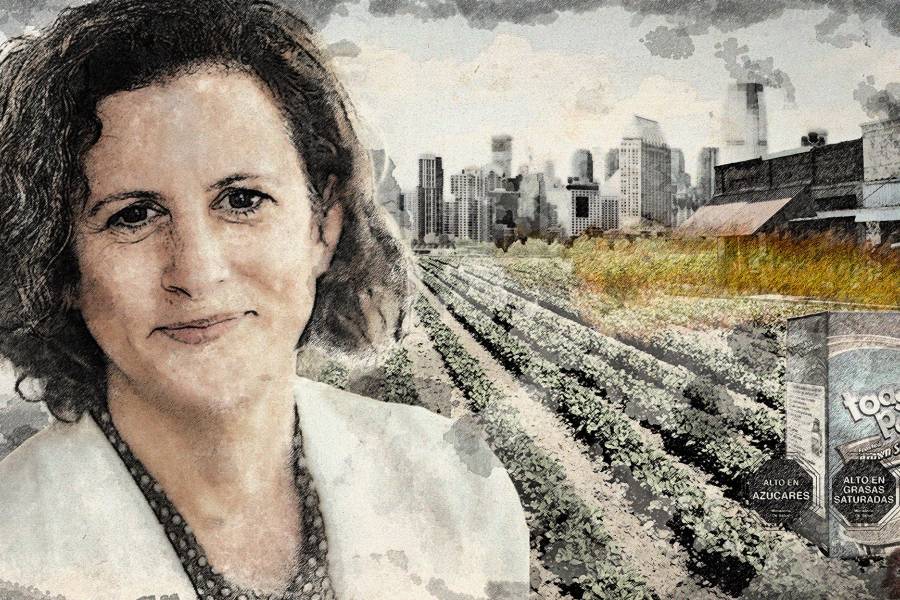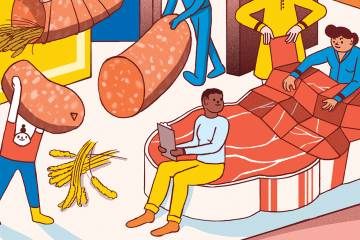Climate change continues to prove itself a real and tangible threat, especially when considering the feedback loop formed by climate change and food systems, says Jess Fanzo, Bloomberg Distinguished Professor of global food policy and ethics at the Johns Hopkins Berman Institute of Bioethics, Johns Hopkins SAIS, and the Department of International Health in the Bloomberg School of Public Health.
"Climate change destabilizes earth systems, which disrupts food systems," she says. "But food systems also contribute to environmental degradation. What do we do about that?"
Fanzo has dedicated her career to studying the ways food systems, economics, and climate affect access to healthy, environmentally sustainable, and equitable diets, especially in areas of the planet where resources are limited or constrained. She says she doesn't think there's a huge window to act to prevent climate change anymore, and we could be headed for a climate catastrophe in which earth systems take over and humans are no longer able to make a difference.
"We have more knowledge than ever before," Fanzo says. "So why haven't we seen an impact when we know so much?"
Last year, she joined a commission of 37 scientists from around the world to publish a report that described a "planetary health diet." According to the report, the diet could feed 10 billion people while also operating within planetary boundaries—a healthy diet that would not exacerbate climate change. But the diet was intended to be a vision, not a plan.
"It was lofty," says Fanzo, who directs the Johns Hopkins Global Food Ethics and Policy Program. "People use the word 'road map'" to describe the report, Fanzo says, "but the diet referenced wasn't intended to be a road map."
The report did not put price tags on anything, for example, or address inequities in nutrition or specify where the burden of change should lie. Some critics pushed back because the report seemed to position a vegan diet as the holy grail, while some countries rely on animal-sourced food for adequate nutrition.
But in addition to setting targets for both nutrition and planetary health, the report's other goal was to make food systems experts and climate experts talk to one another. It got scientists asking questions about planetary boundaries that shouldn't be crossed, and how those barriers affect food systems. For example, how much wild land can be converted to crop land? How much fresh water can be used for growing food? How much biodiversity loss is acceptable, and when do we cross the line?
"The diet got policymakers thinking about interconnectedness, thinking about how much will it cost, what policies it would take," Fanzo says.
She expects the United Nations Food Summit, which will take place in October 2021, to be consumed with the issue of food affordability. Everyone has to work together to take action, she says, but with the looming economic crisis caused by the coronavirus pandemic, will the nations of the world come together to enact effective policies?
"The food supply is moving again, but can people afford food?" she says. "A year from now is when we'll really see the free fall of the global economy. What we're seeing now is just the proverbial tip of the iceberg."
One of Fanzo's current projects, in collaboration with several other partners, is a food systems dashboard. With the dashboard, the goal is to make the data we have on food systems more digestible, more accessible to policymakers and people who can make decisions that affect what kind of food is produced and what kind of food is eaten.
She believes that despite how much is known about food systems and climate, more data are still needed—the right kind of data, which are harder to come by. Scientists still don't really know what people are eating around the world, for example, or why they make the choices they do and where they get their food from. There's a section of the food systems dashboard called "Consumer Behavior," which is broken into four sections—acquisition, preparation, meal practices, and storage—for which no data is offered at all. Fanzo hopes that the dashboard's "no indicator available" message will signal to other researchers the data gaps that exist and the kinds of research that needs funding.
"What you don't know, you can't manage," she says.
The other problem with data, aside from the gaps, is the steady undermining of research in the current political climate. "It's openly disregarded," says Fanzo. There are plenty of solutions that can address the problem, and she hopes to see governments take charge in issues surrounding food system security.
"Assuming that consumers will make the right choice is just not true," Fanzo says. "Governments need to help people make easy, good choices."
One way governments can do that is by keeping industry players in check. Industry dedicates enormous amounts of money to fight government regulations, but mechanisms like taxes on soda seem to be yielding positive results, as are warning labels on food packages. In Chile and Mexico, for example, foods high in sugar, salt, and fat have a black, octagonal warning label. In Chile, these foods can't be sold in schools. In reaction to the label, industries reformulated their products to have less sugar, salt, and fat. Fanzo says that the public health experts who advocated for these labels suffered death threats and had their science discredited—much like what was seen with the scientists studying the tobacco industry decades ago, and climate scientists today.
Still, she says, there are reasons to be hopeful for the future. Agroecology and regenerative agriculture are gaining traction. Producers discuss how to intensify—or grow more food on the same land—sustainably, and there are technologies that can help. Better seeds and integrated pest management hold a lot of promise, for example.
"There's a lot of climate-friendly technology where we can be more sustainable right now, but the incentives are not there yet," Fanzo says. "It's not just a fantasy. It's possible."










